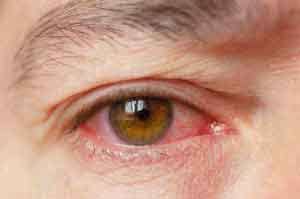What are the most common causes of eye allergies?
Eye allergies, also known as allergic conjunctivitis, are caused by a reaction to allergens.
The most common causes of eye allergies include:
- Pollen: Trees, grass, and weeds release tiny particles called pollen into the air, which can cause allergies when they come into contact with the eyes.
- Dust mites: Dust mites are tiny insects that live in household dust and can cause allergies when they come into contact with the eyes.
- Pet dander: Dander, which is tiny particles of skin, hair, and saliva, can cause allergies in people who are sensitive to pets.
- Mold: Mold grows in damp environments and can cause allergies when it comes into contact with the eyes.
- Certain foods: Some people may have an allergic reaction to certain foods, such as nuts, shellfish, or eggs, which can cause itching and swelling in the eyes.
- Certain cosmetics: Cosmetics, such as mascara, eye shadow, and eyeliner, can cause eye allergies in some people.
- Contact lenses: Contact lenses and the solutions used to clean them can cause eye allergies in some people.
If you suspect you have an eye allergy, it’s important to see an eye doctor for a proper diagnosis and to determine the best course of treatment. We will discuss some treatment options now.

How to treat eye allergies?
Eye allergies can be treated with the following steps:
- Avoid allergens: Try to avoid the substances that cause your allergies.
- Use over-the-counter eye drops: Artificial tears or antihistamine eye drops can help relieve itching and redness.
- Cold compresses: Placing a cold, damp cloth over your eyes can help soothe itching and inflammation.
- Keep your eyes clean: Wash your eyes with water and gentle soap to remove any allergens.
- Prescription medications: If over-the-counter treatments are not effective, your doctor may prescribe stronger medications, such as steroid eye drops.
Doctor Khanna recommends a proper digital slit lamp exam with a eye doctor if you suspect you have an eye allergy to determine the best choice of treatment medicine. Eye Allergies.

Different types of OTC and Prescription medications for allergies
Over-the-counter (OTC) medications for allergies include:
- Antihistamine eye drops: They help relieve itching and redness caused by allergies. Examples are Zaditor and Alaway.
- Decongestant eye drops: They help relieve redness and swelling caused by allergies. Examples are Naphcon-A and Opcon-A.
- Artificial tears: They can help relieve dry eyes and provide a barrier against allergens.
Prescription medications for allergies include:
- Corticosteroid eye drops: They help reduce inflammation and itching caused by allergies. Examples are Lotemax and Pred Forte.
- Mast cell stabilizers: They help prevent the release of histamine and other allergens. Examples are Alomide and Crolom.
- Antihistamine/mast cell stabilizer combination eye drops: They provide both antihistamine and mast cell stabilizing effects. Examples are Patanol and Livostin.
It’s important to note that these medications should be used only as directed by a doctor for any drop can have side effects. Carelessly used they may cause confusion in diagnosis. If your symptoms persist or worsen, it’s recommended to seek medical attention. Eye Allergies.

Can I have allergies from contact lens?
Yes, it is possible to have allergies from contact lenses. Contact lens-related allergies can be caused by the materials used in the lenses, the solution used to clean and store the lenses, or by exposure to allergens such as dust, pollen, or animal dander. Common symptoms of contact lens-related allergies include itching, redness, swelling, and discomfort or pain in the eyes. On examination at slit lamp there can be bumps on the inside of the lid. This is termed Giant papillary conjunctivits. Eye Allergies.
If you suspect you have a contact lens allergy, it’s recommended to remove the lenses and seek medical attention from an optometrist. The eye doctor may recommend switching to a different type of contact lens or solution, or prescribe medication to alleviate the symptoms. In severe cases, the use of contact lenses may need to be discontinued.
What are my options to cure contact lens related red eyes?
If you have red eyes related to contact lens use, you can try the following options:
- Remove the contact lenses: Take the contact lenses out and give your eyes a break. Wear glasses for a few days until your eyes heal.
- Use over-the-counter artificial tears: These can help relieve dry eyes and soothe irritation caused by contact lenses.
- Switch to a different type of contact lens: If you’re using hard contact lenses, consider switching to a different type, such as soft contact lenses, which can be more comfortable.
- Use a different contact lens solution: Try using a different brand or type of solution, or switch to a hydrogen peroxide-based cleaning system.
- Prescription medications: If over-the-counter treatments are not effective, your doctor may prescribe a medication to alleviate your symptoms. This may include a corticosteroid eye drop or an oral antihistamine.
- Stop wearing contact lenses: Switch to glasses or an eye procedure.
Is surgery an option for contact lens related allergies?
Surgery is generally not necessary for treating short term contact lens-related allergies. Most cases of contact lens-related allergies can be effectively managed with changes in contact lens type or solution, or with the use of over-the-counter or prescription medications.
However, if contact lens use is not feasible and the allergies are severe and persistent, a surgical procedure, such as Zeiss Smile, LASIK or PRK, may be considered as a permanent solution to correct your vision and reduce your reliance on contact lenses.
Khanna Vision Institute offers Free Consult to determine if you would be a candidate for Zeiss SMILE laser vision operation. to get rid of your allergies. Your detailed eye exam will be covered by PPO Medical Insurance.